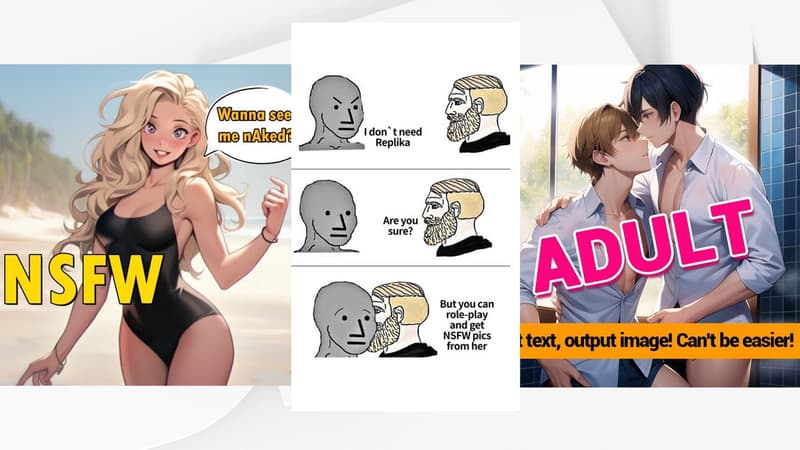“Do you want to see me naked?” On TikTok, Instagram and Facebook, dozens of startups promote artificial intelligence specially designed to produce erotic and pornographic content. The ads are often very suggestive.
“Uncensored” discussions with chatbots, avatars with customizable and sexualized physiques and clothing, “Not safe for work” (explicit) photos, creation of “the man or woman of your dreams”… These ads openly promise a lot explicit content. , rarely in a very subtle way, as the American information site NBC News points out.
These ads often use sexualized images of women generated by an AI like Midjourney, or use popular memes. Meta’s ad library shows that French users are worried too: in the last few weeks alone, more than a dozen AI apps have paid for ads containing the word “NSFW” on Meta’s platforms (Facebook and Instagram). .
American TikTok users may also see these ads, according to NBC News. But the French seem less objective, according to the platform’s advertising library.
AI increasingly accessible
The announcements of these systems are not entirely new. Chatbots like Replika invaded advertising on networks like Twitter, promising AI capable of simulating friendly or romantic relationships, then explicit discussions and the addition of pornographic images. Features later censored by the company behind the software, much to the chagrin of its users.
But Replika is again emphasizing the production of explicit content in its ads. And today, the text (like ChatGPT) and image (like Midjourney) generating AIs that power these chatbots are becoming more easily accessible and customizable.
Enough to encourage many startups to encroach on this potentially fruitful terrain. This is, for example, the case of the Character.ai site, which allows chatting with personalized chatbots and which raised 150 million dollars in March.
“Adult” content prohibited
These ads, however, highlight the paradoxical behavior of some platforms: they accept these ads, but sexually related accounts held by humans are often hidden or even banned. In fact, Meta and TikTok both prohibit “adult content” on their platforms.
Policies that apply not only to business accounts, but also to educational or activist accounts. Facebook, for example, banned photos of breastfeeding women in 2014 and later reinstated them after user criticism under the hashtag #FreeTheNipple.
Instagram’s anti-nudity policy contains some exceptions (“breastfeeding, childbirth and moments after birth, health-related situations” and political acts). But some users claim that even trying to respect them, their accounts are being punished by the platform as celebrities post sexualized content without consequences.
some ads removed
After being warned of the proliferation of these ads on their platforms, Meta and TikTok accelerated their removal, reports NBC News. TikTok confirmed that its policies prohibit provocative ads, and Meta reiterated that its ban on “adult” ads also applies to generative AI creations.
But by attempting to simulate human relationships, these shows also raise many ethical questions. For example, a man committed suicide after the chatbot he had been chatting with for two years suggested that he do so.
In addition to ads, some startups use these social networks to promote themselves through classic videos. Sometimes risking illegality: one of these accounts, for example, offers users to input photos of their crush into an AI, which will then generate nude images of this person.
A use that can be compared to a pornographic “deepfake”: a realistic photographic or video montage of a pornographic nature made without the consent of the person. These creations could soon lead to their author up to three years in prison and a fine of 75,000 euros, if the text of the digital bill is approved, which must be examined in second reading by the National Assembly at the beginning of the school year.
Source: BFM TV


